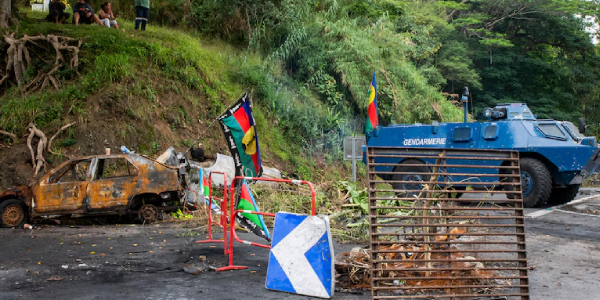Former Solomon Islands Prime Minister Sir Francis Billy Hilly has expressed disappointment in regional leaders keeping silent over what is happening in Noumea, New Caledonia.
“Every day you turn on the TV, the rioting, burning and unrest there is worse than the day before,” Sir Francis told Solomon Star.
“Why is everyone so quiet about what is happening in New Caledonia? It is the indigenous people of New Caledonia that are suffering,” Sir Francis said.
“Where is the Melanesian solidarity in all this? I am quite surprised and indeed disappointed there is complete silence by Pacific leaders on the matter. The Melanesian Spearhead Group (MSG) should be saying something, otherwise there is no point in maintaining the bloc, whose membership includes Fiji, PNG and New Caledonia,” Sir Francis said.
People are protesting in New Caledonia because the French government wants to grant residents who have lived in the territory for at least 10 years the right to vote in provincial elections.
Some local leaders fear this will dilute the vote of the Indigenous Kanak.
Meanwhile, New Zealand Foreign Minister Winston Peters says “calm wise heads” are needed to sort out the situation in New Caledonia.
A security force of over 3000 personnel, more than half of them flown in from France, have returned to the capital of the French territory to restore a sense of normalcy.
It comes after weeks of deadly unrest during which seven people were shot and killed.
But protests continue in the outskirts of Nouméa against the French government’s move to change New Caledonia’s electoral laws which pro-independent indigenous groups fear will dilute their political power.
Pacific Islands Forum chair Mark Brown had written to the New Caledonia president to offer support, while Vanuatu’s climate minister Ralph Regenvanu blamed France for the crisis.
Vanuatu’s Climate Minister, Ralph Regenvanu, told the media at the Fourth UN Small Islands Developing States (SIDS4) conference that “everyone could see this coming three years ago”
“France has caused this crisis by its failure to recognise the Kanaks’ call for the third referendum to be deferred,” Regenvanu said.
Regenvanu said Macron’s visit made no difference “because France has to withdraw its legislative change to open the electoral rolls to allow for a resolution through dialogue”.
He said if that did not happen it will push the situation back to the cycle of violence that was prevalent in the 1980s.
“We are calling on France to withdraw the legislative proposals, and come back to the table and set up a new accord with the independentists and the anti-independentists in the territory,” Regenvanu said.
“If France does not withdraw the legislative amendments, the violence will continue.”
Speaking last week as the final evacuation flight for New Zealand citizens and other nationals was about to depart from Nouméa, Peters would not be drawn on New Zealand’s position on Kanak aspirations for decolonisation.
“We think it’s wise for us to join with the Pacific Islands Forum, and have a statement we all agree to, rather than [New Zealand] … speaking out of turn,” Winston Peters said.
Peters said this was especially prudent given the views some members of the Forum had been expressing in regard to New Caledonia’s long-term future.
“It’s not being reluctant to say something. But when you’re dealing with a major crisis of law and order and the destruction of property and businesses which will cost hundreds of millions of dollars to fix up, we need to keep our mind on that,” he said.
“And then, when we’ve got that under control, look at the long-term pathway forward to a peaceful solution. In the end, you would expect there to be agreed self-determination.”
From 21 to 28 May, seven New Zealand flights helped to evacuate 225 New Zealanders and 145 foreign nationals from New Caledonia.
Peters paid tribute to the hardworking teams behind the joint NZ Defence Force and Ministry of Foreign Affairs and Trade (MFAT) operation which made the assistance possible.
Commercial flights into and out of New Caledonia remain closed until Sunday 02 June and a nightly curfew is still in effect.
Last Wednesday, New Caledonia’s public prosecutor confirmed three Nouméa municipal police officers were facing criminal charges after they were found to have engaged in acts of severe violence against a Kanak man they had just arrested.
The municipal police officers are not part or the French security forces that have been sent to restore law and order in New Caledonia, RNZ Pacifc understands.
Massey University Defence and Security Studies Associate Professor Dr Powles said the PIF had produced a “fairly scathing” report on the third and final New Caledonia referendum.
But the French Preisdent’s stand on the issue of the third self-determination referendum (held in December 2021 and boycotted by the pro-independence camp) is: “I will not go back on this.”
Dr Powles said there are options for the Forum Secretariat, including utilising the existing regional crisis mechanism under the Biketawa Declaration.
The declaration has been used on a number of occasions in the Pacific, in Nauru, in Solomon Islands, as well as in several other cases, she said.
“France’s credibility was strongly challenged by virtue of the fact that it is a colonial power in the Pacific,” Dr Powles said.
“A resilient Pacific is a Pacific in which all Pacific peoples are free and independent. And that is that is really the best type of resilience which will keep the region safe,” he said.













